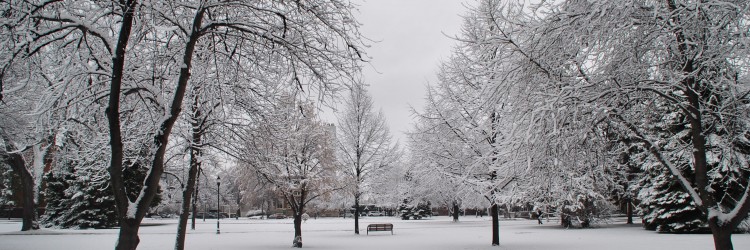Editorial | April 18th, 2018

According to Greek mythology Hades is to blame for the Earth’s mournful state of winter. The story involves Persephone the goddess of nature and Hades the god of the underworld in a classic caper of obsession, abduction, and Stockholm syndrome. Hades had become obsessed with Persephone and captured her as she was picking flowers by the river and hanging out with some river nymphs of questionable repute. According to the tale, she fell through a fissure in the earth and Hades himself dragged her to the underworld.
Here, she was presented with a feast, but refused food and drink until trickery got the best of her and she ingested four pomegranate seeds -- and in Greek mythology if you consume the fare of your captors you’re almost contractually bound to return to them -- whether it be one seed or the whole shebang. But Hades was a captor with a heart and allowed Persephone dual citizenship between the Underworld and the land of the living. Above ground the flora is alive and in full bloom, and when with Hades, the Earth is in a state of winter.
According to the story she eventually developed a fondness for Hades, and judging by the state of this winter, they must be getting along fairly well.
This winter is like a guest that has overstayed their welcome. I hate getting my hopes up as we’re taunted with the idea of spring, and I especially hate scraping my windows in the mornings. Waiting for spring is almost like waiting for a callback. I don’t want to look desperate as I stare at the thermometer tapping my fingers on the table, waiting for some trace of warmth. Though, if there is a silver lining to be found, one proverb from the Farmer’s Almanac states: “Hoar frost on May 1st indicates a good harvest.”
That’s great and all but if there’s snow on the ground on my birthday I’m going to be pissed--and my birthday is in June. I’ll be even more disappointed if the snowdrifts are knee high by the fourth of July.
It could always be worse though.
The year 1816 was known as “The year with no winter” or “The poverty year” or my favorite, “18 hundred and froze to death.” The global climate dropped, crops came up short in the Northern hemisphere, people went hungry and scientific reports attributed it to volcanic activity. Reports of a persistent dry fog were told--so thick that sunspots could be detected. According to “Appalachian Magazine” severe frosts happened monthly--crops and firewood were scarce, prices for commodities went up. The poor had to fend for themselves and on September 13 1816, a Virginia newspaper stated “the cold as well as the drought has nipt the buds of hope”.
Fortunately, morale is high on the prairie and our buds of hope are still intact. On particularly cold days as the Canadian Geese aka “Honkers” return to the north country, I can’t help but wonder what their thoughts were when they came home to find the snow, ice, and cold that they had left months before substituting their webbed flippers for snowshoes navigating the tundra. For some reason I envision them wearing ear muffs as they trudge across the frozen slough and I wonder if any of the "honks" uttered are goose swears.
Or are they like us, grinning and bearing it like a good North Dakotan? I imagine it would be tough for a goose to grin with the way their bills are shaped... so they remain stoic (like a good North Dakotan). No wonder they keep coming back. They must be gluttons for punishment like the rest of us.
February 16th 2026
January 15th 2026
December 18th 2025
November 18th 2025
October 15th 2025

_(1)__293px-wide.jpg)

_(1)_(1)_(1)_(1)_(1)__293px-wide.jpg)
_(1)_(1)_(1)_(1)_(1)__293px-wide.jpg)
__293px-wide.png)